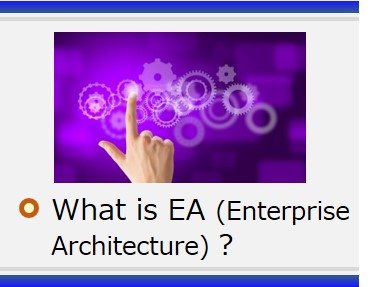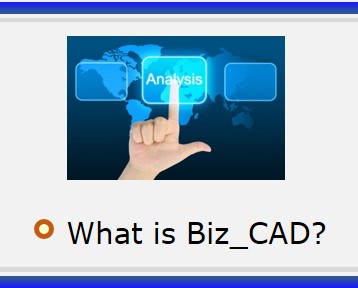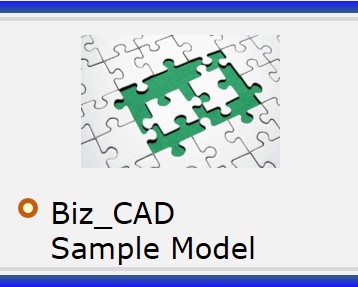A Practical Guide toFederal Enterprise Architecture Chief Information Officer Council Version
1.0 February 2001
http://www.gao.gov/assets/590/588407.pdf
What is EA (Enterprise Architecture)?








EA (Enterprise Architecture) means the structure and composition of the whole enterprise. The artifact is equivalent to the "blueprint of the company", and also has significant value from the stand point of corporate management view.
EA (Enterprise Architecture) is created to consolidate the mushrooming
and duplicated business and information systems, and its origin is optimization
of investment for information systems.
In the early 1990s, the US federal government was struggling with huge
budget deficits. Then the investment for the information systems was focused
and accused. Many information systems were deployed independently by each
agency and department, and many of those systems duplicated in functions.
And, at that time, various open architecture started to penetrate the business
field as a practical system.

Backed by these, "EA framework Ver1.1 (Federal Enterprise Architecture
Framework ver1.1 (1999))" was established. Even after the publication,
the version up has been made and Version 2 of the Federal Enterprise Architecture
Framework (FEAF-II) was released in 2013.
Although EA was originated by the government which easily falls into vertical
sectionalism, but sectionalism is not just a matter of government. Even
in the private sector, it will be difficult to grasp the whole of the large
company. Such problems can be easily detected especially in the companies
which organized by the system of division Company for long time and experienced
large-scale merger and acquisition. And also, If a corporate group is deemed
to be a one organization, structural fatigue of sectionalism will be highlighted.
EA (Enterprise Architecture) is for solving these problems, and is created
to achieve the overall optimum.
EA (Enterprise Architecture) is often created based on the following reference
model.

The Business Architecture at the top of above model is to represent the business itself. And each
architecture of Data, Application and Technical literally represents the
data, application system and infrastructural technology of information
systems.
Originally there was no Business Architecture (BA) in the reference model.
However, then the Business Architecture (BA) as a upper concept was added
based on the concept that “EA cannot be completed without business” and
“In order to consolidate the duplicated information systems, the business
must be rationalized first”.
It is recommended that the notation for representing the Business Architecture
(BA) should be the notation for system design such as UML (please see the example suggested by government CIO below).
It is like using a Mercator projection in making aerial maps to use system
design notation for business representation. Such idea implies that there
is no appropriate notation for business representation. Furthermore, artifacts
of the EA which was created based on the inadequate notation is apt to
be too enormous unnecessarily, while not achieve the original purpose of
the EA (Enterprise Architecture). Then, such huge and out of tune artifacts
would have been dead storage in the cabinet.
However, the above guidelines is not created for the private sector, but
the guidelines for government. Therefore, when the private companies plans
to develop EA (enterprise architecture), best notation and best platform
can be adopted freely without any preconception. For instance, if you establish
EA (Enterprise Architecture), the model consists of only Business Architecture
(BA), without data, applications, technical Architecture can be one option
of EA (Enterprise Architecture) modeling.

Then, what kind of notation and platform will be the best choice for EA (Enterprise Architecture) modeling. Its requirements can be summarized as follows.
- In particular, the model of Business Architecture must be easy to understand for business persons in the real business field and should be grasped at a glance by them. Otherwise, the models will not be utilized in real business and will be hoarded in a cabinet as artifacts of past project.
- In order to achieve the objective of EA (Enterprise Architecture) and consolidate the duplicated and wasteful processes, real 5W2H of businessmust be represented adequately, including meaning of business and significance (why), sales amount, profits and cost of business (how much), business process flow and execution means (how) and subject of business execution (who).
- The maintenance and operating costs related to each information system should be represented on the platform because the optimization of information system is one of the main purpose of EA (Enterprise Architecture).
- Capable of extracting the business, information systems and organizations related to one specified function.
- In order to detect redundancy and duplication effectively and exhaustively, the models should be created and analyzed on the same one platform, and the platform should have the function to represent the business and information systems from the various viewpoints.
- Capable of representing and analyze enterprise-wide and whole corporate group with the hierarchical modeling feature.
- Have a variety of added value, versatility and practicality, which enable to continue to utilize the created artifacts in the real
business and system management, preventing them from "remaining closed
to the cabinet".
Biz_CAD provided by BizArchitech Corporation is the best solution for EA (Enterprise Architecture), which pursues comprehensibility for end users based on its simple notation rules and graphical representation. Also, Biz_CAD represents the 5W2H + α of business including sales amount, profit, cost, information systems and organization, and enables the hierarchical analysis for large-scale domain. These characteristics of Biz_CAD brings the variety of added value. By all means, please consider the utilization of Biz_CAD.
